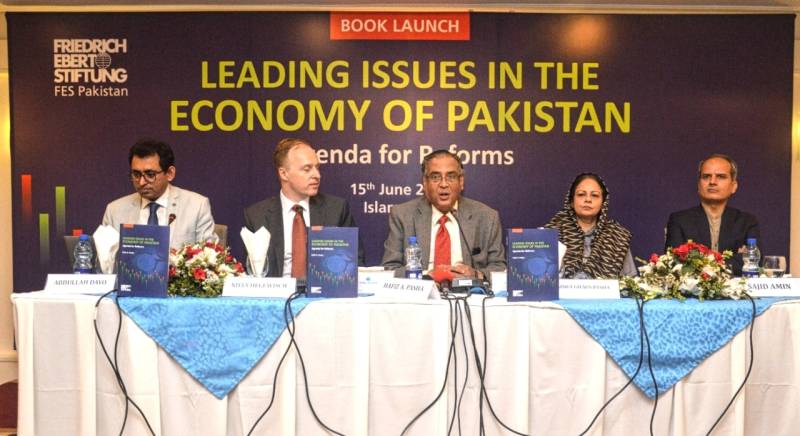
Pakistan's foreign exchange reserves are 16 billion dollars less than the country's requirement. Pakistan's biggest problem is multilateral debt, and this problem will not be solved without large foreign exchange deposits from friendly countries.
Dr Hafiz Pasha expressed these views during the launching ceremony of his book on “Leading Issues in the Economy of Pakistan” organized by Germany’s leading political think-tank Friedrich Ebert Stiftung (FES). Dr Niels Hegewisch, Country Director of FES Pakistan, and Dr Aisha Ghaus Pasha, State Minister for Finance and Revenue also attended the ceremony.
Dr Hafiz Pasha highlighted the major challenges faced by the Pakistani Economy. According to his study, repayment of loans is the biggest challenge for Pakistan. Most of the loans were obtained from the same sources. The second major challenge is to meet the conditions of the IMF, according to Dr Hafiz Pasha. The major objection of IMF is on tax amnesty.
He further explained the reasons of the looming condition of the economy. He said wrong economic policies are pushing the economy towards default. He showed concern that development projects worth Rs 9,000 billion could not be completed in decades. "These projects will not be completed even in the next 18 years".
Dr Hafiz Pasha said that PSDP used to be 3% of GDP in the past. "Now it is less than 1 percent. Pakistan is ninth among 11 countries in the world that have come close to default."
He presented the glaring facts about increasing inflation and unemployment in Pakistan. "There is a risk of food inflation going up to 53%," said Hafiz Pasha. "The main reason for this is the relentless increase in the value of the dollar. 10 to 11 percent more people became unemployed due to floods. The number of unemployed people is around 2.5 million. 1.1 million people were already unemployed."
He further said that 2.5 million people are living below the poverty line." The government needs Rs 2,400 billion to control this poverty. Salaries and pensions will have to be increased by Rs 600 billion next years to protect against inflation."
"The government will have to revise the trade agreements," said Dr Hafiz Pasha. The balance of Pakistan-China trade is 90% in favor of China, he further explained.
State minister for finance Dr Aisha Ghaus Pasha also shared her views on the occasion, saying that "we are well aware of the forces in power structure preventing reforms". She further said that even on the 100th anniversary, there would be hue and cry about the problems of Pakistan. The minister of state emphasized that Pakistan has to increase its economic growth rate. "For this purpose, Pakistan has to decide on suitable measures".
Dr Aisha Ghaus Pasha concluded with the remarks that welfare measures have to be taken along with macroeconomic policy for improving Pakistan's economy.
The event was attended by senior political leaders, economists, civil society and media.
Dr Hafiz Pasha expressed these views during the launching ceremony of his book on “Leading Issues in the Economy of Pakistan” organized by Germany’s leading political think-tank Friedrich Ebert Stiftung (FES). Dr Niels Hegewisch, Country Director of FES Pakistan, and Dr Aisha Ghaus Pasha, State Minister for Finance and Revenue also attended the ceremony.
Dr Hafiz Pasha highlighted the major challenges faced by the Pakistani Economy. According to his study, repayment of loans is the biggest challenge for Pakistan. Most of the loans were obtained from the same sources. The second major challenge is to meet the conditions of the IMF, according to Dr Hafiz Pasha. The major objection of IMF is on tax amnesty.
He further explained the reasons of the looming condition of the economy. He said wrong economic policies are pushing the economy towards default. He showed concern that development projects worth Rs 9,000 billion could not be completed in decades. "These projects will not be completed even in the next 18 years".
Dr Hafiz Pasha said that PSDP used to be 3% of GDP in the past. "Now it is less than 1 percent. Pakistan is ninth among 11 countries in the world that have come close to default."
He presented the glaring facts about increasing inflation and unemployment in Pakistan. "There is a risk of food inflation going up to 53%," said Hafiz Pasha. "The main reason for this is the relentless increase in the value of the dollar. 10 to 11 percent more people became unemployed due to floods. The number of unemployed people is around 2.5 million. 1.1 million people were already unemployed."
He further said that 2.5 million people are living below the poverty line." The government needs Rs 2,400 billion to control this poverty. Salaries and pensions will have to be increased by Rs 600 billion next years to protect against inflation."
"The government will have to revise the trade agreements," said Dr Hafiz Pasha. The balance of Pakistan-China trade is 90% in favor of China, he further explained.
State minister for finance Dr Aisha Ghaus Pasha also shared her views on the occasion, saying that "we are well aware of the forces in power structure preventing reforms". She further said that even on the 100th anniversary, there would be hue and cry about the problems of Pakistan. The minister of state emphasized that Pakistan has to increase its economic growth rate. "For this purpose, Pakistan has to decide on suitable measures".
Dr Aisha Ghaus Pasha concluded with the remarks that welfare measures have to be taken along with macroeconomic policy for improving Pakistan's economy.
The event was attended by senior political leaders, economists, civil society and media.

